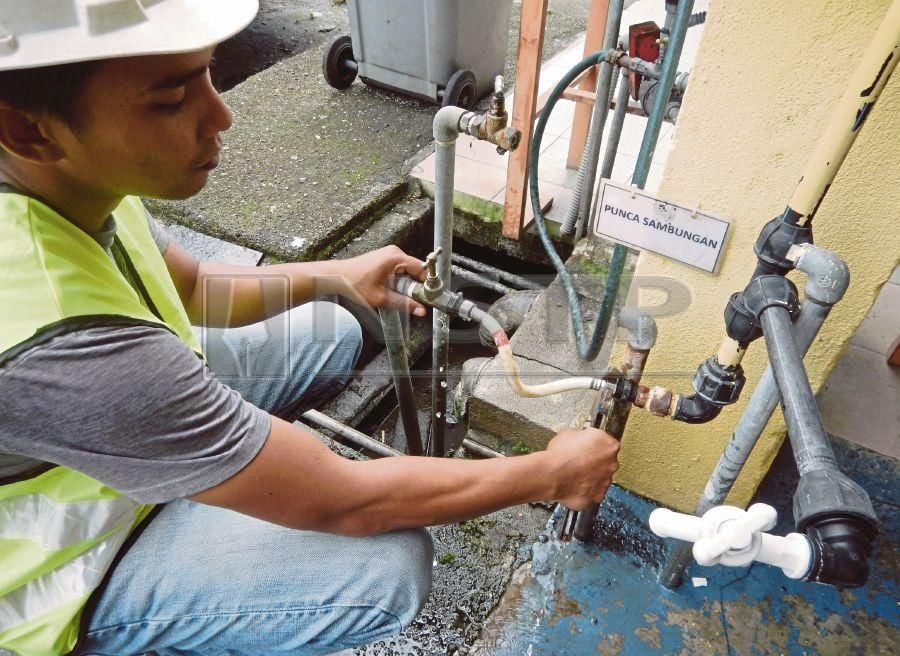MALAYSIA is a country rich in water resources. In 2016, it recorded 907 million cubic meters (m3 ) of annual rainfall. The average annual rainfall is quite high, between 2,000mm and 4,000mm a year. The abundant quantity of water resources allows us to sell water to neighbouring Singapore.
On providing water to consumers, 95 per cent of the population have access to water. The country’s water tariffs are also among the lowest in the world.
There is also no limit on the use of water. With the wealth of water resources, it seems impossible that we would face water shortages. But, unfortunately, we do.
Since the 1970s the country has faced several water crises — in 1977 and 1978 in Peninsular Malaysia’s northwest; 1982 and 1991 in Kedah and Perlis (the Pedu and Muda Dam), 1998 in Kedah, Penang and Kuala Lumpur (as an impact of the El Nino) and in 2002 drought which affected Perlis and caused a water shortage.
The water crises have led to water rationing and affected the life and wellbeing of many users. In 2014, when there was an unusually dry season, the water rationing lasted for months. In 2016, 85,000 people in Johor faced water rations due to low water levels in water treatment plants.
Malaysia also faces the problem of high non-revenue water (NRW). This is one of the main causes of water shortage. In 2016, the NRW ratio was at 35.2 per cent. Perlis recorded the highest at 60.7 per cent, while the other states that recorded more than 40 per cent were Sabah (52 per cent), Kelantan (49.4 per cent), Pahang (47.9 per cent) and Kedah (46.7 per cent).
The rates were extremely high compared to Japan (three per cent) or Singapore (five per cent). Mostly, the loss of water occur as a result of pipe leakage and water theft. Household and commercial water users can and should play an active role by reporting the problem to the authorities. Problems such pipe leakage or burst pipe could be resolved sooner if we reported the cases. But, are consumers aware of their roles? Do they make a report immediately, or are they just apathetic?
Consumers have a direct impact on water problems. For example, excessive water contributes to wastage.
Based on the Malaysia Water Industry Guide (2015), the average water consumption per person (water consumption per capita) is 211 litres per day in 2014.
Water consumption varies by state — the highest water consumption of 293 litres per capita per day is Penang and the lowest is Sabah (114 litres per capita per day). This is above the World Health Organisation recommended rate of 165 litres per capita per day.
Water consumption among Malaysians is indeed high. Why is this? Are we not aware of our abundant water resources that we do not appreciate what we have? Is the problem related to the low price of water? Yes, the price of water in Malaysia is among the lowest in the world.
Perhaps, that is why Malaysians take it for granted because they do not feel the pinch.
Our water resources are also threatened by pollution, which affect the quality and quantity of the water. If this condition is left unattended, the state of water resources cannot be maintained or sustained.
We have to protect our water resources and water-related ecosystems such as the forests, mountains, wetlands and rivers.
Water-related problems must be addressed soon, and for the long term to ensure the water’s availability and sustainability. Failing that, we would not be able to meet the United Nations Sustainable Development Goals (SDGs) 2030 target, which is to ensure access to clean water and sanitation for all.
Water conservation is our duty.
In Islam, water is a valuable resource and “abusing” it is against the principles of environmental conservation. The principles can be translated into the understanding that Allah created everything in this world which includes water.
Water is vital to all forms of life; the destruction of water resources would mean the destruction of other forms of life as well. To protect the life of other creatures, water must be conserved.
If we believe that water is an essential element in maintaining life and is needed for the survival of all of Allah’s creations, then we must make efforts to conserve it.
Azrina Sobian is a Fellow at the Centre for Science and Environment Studies, Institute of Islamic Understanding Malaysia (IKIM)
